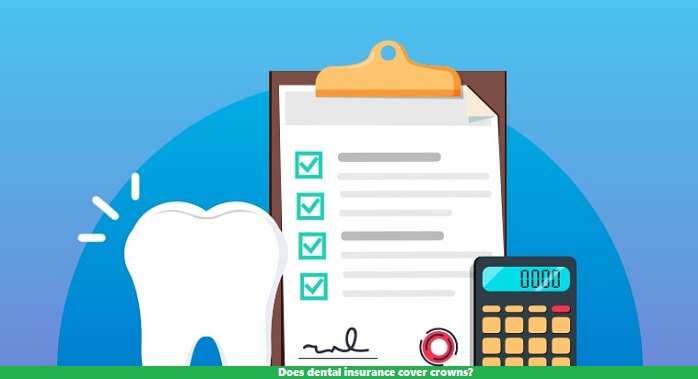Does dental insurance cover crowns? Want to know the answer straight away? Well, the answer is not always. Whether you will get the coverage or not depends on WHY you want the coverage. For example, if you wish to the procedure for cosmetic reasons so that your smile looks good, you will not be applicable. If you want the procedure for medical reasons, rest assured, you will get the coverage. Some other conditions influence how much coverage you will get for the procedure. Let’s discuss them in detail.
What Do You Mean By A Dental Crown?
A dental crown is the teeth visible above your gumline. And crowns are the teeth that show themselves on smiling. If crowns are damaged, you may experience tooth sensitivity. In such a case, a dentist prescribes you get an ‘artificial crown’. This artificial crown works as a barrier and helps in tooth sensitivity.
Also read: What Does Dental Insurance Cover? [Ultimate Guide]
There are various types of crowns available in the market. These mainly differ depending on the material they are made from— Porcelain, a Composite Resin, a Metal Alloy, or a mixture of Porcelain and Metal.
When Should You Get A Crown?
Here are several conditions that should trigger your decision to get this procedure done.
- A chipping tooth
- You have a cavity that which a filling cannot effectively cover
- Or you have got a filling done that keeps wearing down and causes the cavity to expand.
- Lastly, you have a weakened enamel due to severely decayed tooth.
All these conditions demand that you have an artificial crown done.
What Are The Benefits Of Getting An Artificial Crown?
An artificial crown has both aesthetic and medical benefits. If you have a decayed tooth with a weakened enamel, then getting a crown done can work as a cap over it. This cap will protect the tooth from further decay and sensitivity.
Also read: Does Dental Insurance Cover Dentures?
The other benefit is the aesthetics. Suppose you have a discolored tooth. You can use this treatment for color matching with your remaining teeth. But the issue with this benefit is that your policy might not cover you in this case. Dental insurance usually does not covers cosmetic treatments.
What Is The Cost Of Getting An Artificial Crown?
As you know, there are many types of crowns available, so there is no exact cost of this treatment. But the final cost of crowns depends on these factors:
- Whether your procedure is covered by insurance
- Your deductible amount
- Any other service you may need in that sitting. For example, you also get a filling done.
- Lastly, if the dentist needs to perform some extra work on the tooth.
But on average, a single crown can cost you anywhere from $600 and $1,500.
How Does Dental Insurance Pay For Various Services?
#1: Annual Coverage Cap
The first condition with dental insurance is that it has an annual maximum coverage cap. This yearly coverage cap has its median at $1,500. This clause means that the insurance companies will not pay you more than this figure in a year. If your expenditure on dental health and wellness exceeds this set figure, you will have to pay the rest from your pocket.
Though, significantly fewer people cross this annual coverage cap. The reason? Preventive care. If you detect the problem before it grows big, you can cut heavily on the expenses.
#2: The Three-Tier System
Next, we have the three-tier system of paying for services. The insurance companies do not pay the full fees for all services.
Yes, they have a three-tier system for paying for services, and it is called 100-80-50. They pay for the full price of preventive and diagnostic services, i.e., 100%. Next are the Basic services like filling and extraction, etc. The insurance companies pay the 80% of the full fees of these treatments. Lastly, we have the Major services like crowns, dentures, inlays and outlays, etc. The insurance companies pay only 50% of the cost for these services. Note that some processes like a root canal can be categorized as Basic or Major, depending on the plan you choose. So, do remember to check which services are under which category in your policy.
Since crowns usually come under the Major services, the insurance companies only pay about 50% of the cost.
#3: Waiting Period
There is a period between when you buy your policy and when you can actually use it to pay for services. This period is called the waiting period. Though usually, this waiting period is for non-emergency services like dentures and crowns. It is not for accidental cases.
Also read: What to know about Short Term Health insurance
This period usually stretches from three months to one year. Many companies can extend it to even two years.
So, it is always in your benefit to get a policy when young and healthy. Otherwise, you may have to wait unnecessarily or pay the full fee.
Another point to note here is that, say you have any pre-existing disease or condition when applying. The insurers are not liable to pay you in this case. If there is a pre-existing condition, you will have to pay from your pocket. This clause is done to discourage people from buying policies for impending procedures.
Thus, do not wait to get ill for buying a policy. If you think that a dental policy can be useful, purchase it well in advance.
Does dental insurance cover crowns?
So, in a nutshell, there are a few questions you must ask yourself before you arrive at the final answer.
Q1: Whether you are taking the procedure for cosmetic reasons or medical.
Q2: How much annual coverage limit you are still left with?
Q3: How much percentage of the bill will the insurer share?
Q4: What is the waiting period for crowns in your policy, and how long have you had this policy?
Once you answer these questions, you will know the exact status of whether your policy will cover you or not.
So, this was all in our guide about does dental insurance cover crowns. We hope you liked it and found it useful.







